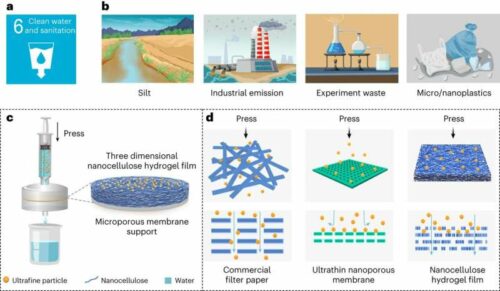With an eye on the United Nations’ Sustainable Development Goals, the researchers aim to scale up this technology, bringing clean water to those in need.

A water filtration system developed by researchers at the University of Texas at Austin could revolutionise access to clean drinking water for over 2 billion people worldwide. Targeting remote and underdeveloped regions grappling with particle-polluted water sources, the innovation offers an immediate and practical solution. The portable filtration system, outlined in a study published in Nature Sustainability, boasts remarkable efficiency, eliminating nearly 100% of particles larger than 10 nanometers. Unlike existing options, such as filter paper and microporous membranes that filter only 40% to 80% of these particles, the new system provides a game-changing approach.
Crafted from low-cost and sustainable materials, the key innovation lies in an intertwined web of nano cellulose fibres that captures particles, allowing the purified water to pass through. Users simply collect water using a syringe and inject it through the filter, producing clean, drinkable water effortlessly. Professor Guihua Yu, a leading researcher on the project, highlighted the urgency of addressing water contamination issues, especially in regions heavily reliant on polluted water sources. The researchers aimed to create a solution that significantly improves freshwater availability and is cost-effective, simple to use, and environmentally sustainable.
The hydrogel filter has been rigorously tested with various water sources, including muddy water, river water, and water contaminated with microplastics. The biodegradable hydrogel films can be used up to 30 times before replacement, adding to the system’s appeal. Motivated by the United Nations’ Sustainable Development Goals, the research team envisions scaling up the technology to address global drinking water needs. They have successfully tested the system with syringes handling up to 1.5 litres, approximately 40% of an individual’s daily drinking water requirements.
The researchers emphasised the urgent need for universal, efficient materials and devices to purify particle-contaminated water, underscoring the system’s potential to bring clean water to people worldwide. Collaborators from Northeast Forestry University, Shanghai Tech University, and Tsinghua University joined forces on this transformative project, collectively contributing to improving drinking water standards globally.







